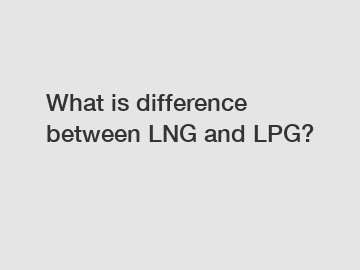What is difference between LNG and LPG?
What is the difference between LNG and LPG?
Liquefied Natural Gas (LNG) and Liquefied Petroleum Gas (LPG) are two commonly used forms of energy, but many people are still confused about the differences between them. In this article, we will explore the disparities between these two gas forms and their respective uses. So, let's dive in and understand the dissimilarities between LNG and LPG.
1. Composition and Source:

LNG primarily consists of methane gas, which is the main component of natural gas. It is extracted from underground gas reserves. On the other hand, LPG is a mixture of propane and butane, derived from refining crude oil. The composition variation is the primary distinction between LNG and LPG.
2. Physical State and Transportation:
LNG is produced by cooling natural gas to around -162 degrees Celsius, causing it to liquefy. This liquefaction process drastically reduces the volume of the gas, making it more efficient for transportation and storage. The liquid form allows LNG to be transported in large quantities using specialized cryogenic tankers. It is then regasified upon reaching its destination for use.
LPG, on the other hand, is stored and transported under moderate pressure as a gas but can easily be converted into a liquid state by applying moderate pressure or cooling. LPG is commonly stored and transported in cylinders or tanks.
3. Energy Density and Applications:
Due to the different composition and compression methods, LNG and LPG have different energy densities. LNG packs more energy content per unit volume when compared to LPG. This higher energy density makes LNG more suitable for long-distance transportation and large-scale energy applications.
LNG is widely used in power generation, industrial processes, and as a fuel source for transportation, particularly in heavy-duty vehicles like trucks and ships. Its clean-burning nature, low emissions, and efficient combustion make it an attractive alternative to diesel or heavy fuel oil.
LPG, on the other hand, boasts a higher energy density compared to natural gas and is commonly used for heating, cooking, and powering vehicles such as cars, forklifts, and smaller boats. LPG is also used as a propellant in aerosol products and an alternative to gasoline or diesel in some vehicles.
4. Storage and Infrastructure:
The storage and infrastructure required for LNG and LPG also differ. As mentioned earlier, LNG requires specialized cryogenic tanks to maintain its extremely low temperature. These tanks are typically found in LNG terminals and storage facilities. However, the cryogenic nature of LNG demands careful handling, making the infrastructure more critical and expensive. The regasification process also requires additional equipment.
LPG, on the other hand, can be stored in cylinders, tanks, or underground storage facilities with much simpler equipment. Its lower boiling point compared to LNG facilitates easier handling and storage, allowing for a more widespread infrastructure network.
In conclusion, the difference between LNG and LPG lies in their composition, physical state, transportation methods, energy density, and applications. LNG primarily consists of methane and is transported in a highly compressed, liquid form. It is primarily used in large-scale energy applications, power generation, and transportation. LPG, a mixture of propane and butane, is typically stored and transported as a gas and is commonly used for heating, cooking, and smaller-scale energy needs. Understanding the distinctions between these two forms of energy can help in choosing the most suitable option for various applications.
Contact us to discuss your requirements of LNG, CNG, LPG and Industrial Gas solution, LNG Transportation Equipment, LNG vaporizing station supplier. Our experienced sales team can help you identify the options that best suit your needs.

Comments
0